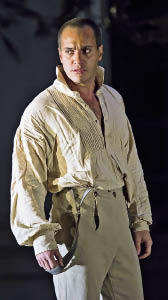Le nozze di Figaro
Royal Opera House, in rep until 3 July
The Pearl Fishers
English National Opera, in rep until 8 July
A Midsummer Night’s Dream
English Touring Opera, in Cambridge
The Marriage of Figaro, in a fine performance, makes an impression different from that of any other opera. Almost all the characters are in a state of anxiety or rage or misery or frustrated lustfulness throughout, and they are vividly portrayed in the round; yet the listener is in a constant state of joy, from the mutinous opening scurryings of the overture onwards. When it is as marvellously conducted as at the Royal Opera, by Colin Davis, what is always a pleasure becomes more than that, and one ends in ecstasy, feeling both that one knows the truth about human beings, and that, despite it all, there is an underlying value and lovableness in them. Davis’s Mozart hasn’t so much changed over the years as deepened. It is pleasingly disregardful of fashion: the winds don’t bark at you, the strings are warm rather than edgy, speeds are on the whole moderate. It feels, sounds, natural, unforced. I noticed dozens of things I hadn’t heard before, but never felt that they were being thrust at me.
David McVicar’s production still annoys with its fussiness, its overpopulation and its impertinence in acting out the overture, but the male characters at least are wonderfully drawn. I have never seen a production in which the Count and Figaro are so ferociously antagonistic that it seems that fisticuffs are inevitable. Erwin Schrott’s Figaro is lived in every note and movement, and with his gorgeous voice this is as complete a Mozart characterisation as I have seen. Mariusz Kwiecien’s Count is in the same league, and their confrontations are highlights of an opera which is, in truth, all highlights. The leading female roles aren’t cast quite so strongly, and Eri Nakamura as Susanna saved herself for ‘Deh vieni’, but her account of that was so delicious you almost forgave her. Jurgita Adamonyté’s Cherubino is too petite in all respects, though charming Annette Dasch’s Countess is on the grand scale, and her forgiveness at the end is overwhelming. This was an evening in a thousand.
The word ‘hokum’ seems to have departed the language, but the ENO’s new production of Bizet’s The Pearl Fishers makes it imperative that it returns, for both the work and the production are completely covered by it. Fishers provides, of course, the Nation’s Favourite Duet, which arrives early on, and is remembered fairly often throughout the score. There isn’t much else in the way of melodic succour, and what there is has such a large debt to Gounod that it would be preferable to revive one of his less-played works. Bizet, at the start of his uneasy operatic career, commits every kind of clumsiness.
ENO has decided to go for broke, with elaborate sets, and a superb opening projection which should definitely be retained for their next account of Das Rheingold. Essays in the programme talk of tsunamis, global warming and so forth, but how can one possibly relate the low camp proceedings onstage to them? The heroine Leila was sung poorly by Hanan Alattar in Act I, but improved, though her voice is reedy and unsensual. Alfie Boe was at his best, and Nadir’s friend-rival was powerfully taken by Quinn Kelsey. But the new translation already sounds fustian, and I was left wondering why this opera should be revived — what about giving one of Bizet’s other pre-Carmen operas a whirl?
Of the three operas that English Touring Opera are taking round the UK, the only one I was able to see was Britten’s A Midsummer Night’s Dream. The staging and production are excellent, and the director James Conway’s note in the programme is so intelligent that, bizarrely, one is grateful to the opera for stimulating it. But I continue to find Dream painfully uninspired. The magic rustlings of sleep at the start are so promising, but very little in the rest of the work lives up to them, and a great deal is parsimonious even by Britten’s standards. The star of the show is the Puck (a speaking role) of David Gooderson, quite unlike the usual idea of this mischief-maker, but droll and slightly sinister, as Oberon’s servant should be. I can’t feel that the play has been successfully truncated: some of the best material in it has gone, while the mechanicals seem ever more wearisome.
Departing from my brief, I must add a note about the Chopin recital that Janina Fialkowska gave last week at the Cadogan Hall. She has recovered from cancer of the shoulder muscle, and her technique is up to the extreme demands that the composer and she make of it. In a programme of largely familiar works, admirably assorted, she plumbed and stormed Chopin’s depths and heights with unfailing taste and imagination, illuminating everything she played. Incredible that the hall should have been so empty.






Comments